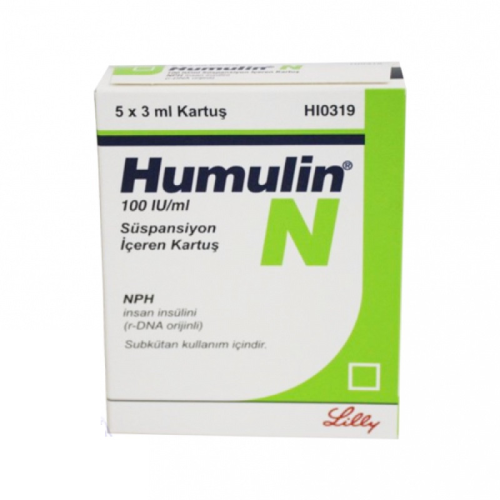Humulin N 100IU (Cart)
- Brand: Lilly
- Product Code: Humulin N 100IU (Cart)
- Availability: In Stock
-
$53.00
CLASSIFICATION
Hormone and Synthetic Substitute / Antidiabetic Agent
ACNE
No
WATER RETENTION
No
HBR
No
HEPATOTOXICITY
No
AROMATIZATION
No
MANUFACTURER
Lilly
WAREHOUSE
International Warehouse 2
SUBSTANCE
Insulin
,
Insulin is a potent anabolic hormone necessary for proper bodily function, produced naturally by humans. However, individuals with diabetes often require exogenous insulin, which may also be utilized by some performance athletes to promote lean tissue growth. Despite its benefits, using insulin for non-prescribed purposes can be extremely dangerous and requires extreme caution.
The introduction of exogenous insulin dates back to the 1920s, originating not from synthetic sources but from the pancreas of dogs and later from cattle and pigs. Although concerns about purity existed, the lifesaving potential of this treatment for diabetes made it invaluable at the time. By the 1970s, purification methods improved significantly, leading to the launch of the first synthetic insulin by Ciba in 1975. A few years later, in 1982, the FDA approved Humulin-R, a precise replica of human insulin.
Functions and Characteristics of Insulin:Insulin, a peptide hormone secreted by the pancreas, plays a crucial role in managing the utilization of glucose, amino acids, and fatty acids. Additionally, it prevents the metabolic breakdown of glycogen, fat, and protein.
Diabetes manifests in two primary forms necessitating insulin administration. Type I diabetes, often an autoimmune condition, leads to insufficient insulin production, while Type II diabetes involves the body's inability to effectively use insulin it produces, generally linked to obesity.
As a peptide hormone, insulin positively influences the liver by promoting the conversion of glycogen to glucose while inhibiting non-carbohydrates from being transformed into glucose. It also facilitates glucose diffusion into cells, encouraging muscle growth. Elevated insulin levels are associated with increased protein synthesis, enhanced bone density, and higher production of Insulin-Like Growth Factor-1 (IGF-1), an anabolic hormone structurally akin to insulin.
Furthermore, insulin has been shown to stimulate the production of Luteinizing Hormone (LH) and Follicle Stimulating Hormone (FSH), potentially boosting testosterone levels in the body, although this effect is relatively mild.
Effects of Insulin:In both types of diabetes, insulin regulates blood sugar levels, showcasing its strong anabolic and anti-catabolic properties, which can also benefit athletes. However, using insulin off-label — for those without diabetes — carries significant risks, such as weight gain and severe health issues, including potential death if not used correctly.
Athletes may find insulin beneficial due to its anabolic effects, but they must manage body fat effectively. High insulin levels can inhibit fat-burning capabilities, necessitating a well-planned diet to ensure nutrients are directed toward muscle rather than fat storage. Optimal timing for insulin use is immediately following intense weight training, accompanied by food; this will be elaborated on later.
When used properly, insulin can lead to impressive gains in muscle mass over a short period. Though it may be challenging to manage body fat levels, it is feasible under the right conditions. Combining insulin with anabolic steroids and Human Growth Hormone (HGH) is often recommended for enhanced growth and improved fat control.
Side Effects of Insulin:Potential side effects primarily include hypoglycemia, a significant risk for performance athletes. While diabetics can manage this with proper dosing, hypoglycemia in athletic settings poses serious risks. Symptoms include dizziness, nausea, fatigue, blurred vision, and in extreme cases, may lead to death.
If hypoglycemic symptoms arise, immediate consumption of fast-acting carbohydrates (such as candy or juice) is crucial. Individuals should not sleep after insulin administration if drowsiness occurs, as this can lead to dangerous levels of low blood sugar while unconscious. Additionally, severe hypoglycemia requires prompt medical attention, suggesting that insulin use should always involve a companion for safety.
Besides hypoglycemia, allergic reactions to insulin can occur, such as swelling or irritation at injection sites, although these are rare. More severe reactions, like rashes or shortness of breath, although uncommon, should be addressed swiftly by medical professionals. Another side effect is localized fat accumulation at repeated injection sites; rotating injection areas can help mitigate this issue.
Insulin Administration:For diabetes management, insulin dosages vary based on individual needs. However, performance-enhancing use must be approached with care. Various insulin types exist, with athletes primarily using fast-acting forms like Humulin-R, Humalog, and Novolog.
Humalog starts working within 15 minutes, peaking at 30-90 minutes with effects lasting 3-5 hours. While Novolog and Humulin-R have similar profiles, Humulin-R is more readily available without a prescription. The general recommendation for performance enhancement is 1 unit of insulin per 10 pounds of body weight. First-time users should start lower and gradually increase their dosage, paying attention to hypoglycemic symptoms.
The ideal time for insulin use is immediately post-weight training, followed by a carbohydrate intake of at least 100 grams, accompanied by protein. Although this is the minimum, some may require more, necessitating a cautious approach to avoid excessive insulin dosages.
After administering insulin and consuming carbohydrates, it’s critical to keep fast-acting carbohydrates nearby to address any onset of hypoglycemia. Individuals should not inject insulin without ensuring they have immediate access to carbs. After the initial post-injection meal, planning to eat again soon is advised.
Conclusion on Insulin:Insulin plays a vital role in health and function, offering unique advantages in muscle building. Its use, however, carries significant risks, particularly for those prone to body fat gains. Many individuals may find it unnecessary for their fitness goals and could achieve better long-term results by avoiding it. Nonetheless, its allure persists, especially within competitive bodybuilding environments. Athletes not focused on physique often use insulin discreetly to evade drug testing, combining it with other substances at lower dosages.

